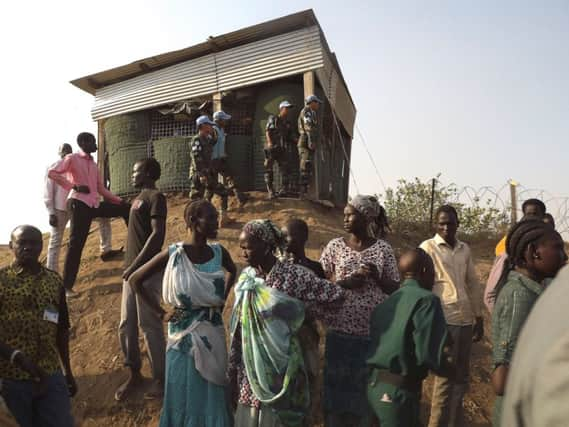South Sudan president calls for peace talks


Clashes that erupted in Juba late on Sunday spread yesterday to the flashpoint town of Bor, north of the capital and scene of an ethnic massacre in 1991 that has raised fears of slide back into conflict between clans.
President Salva Kiir, a member of the dominant Dinka, has blamed the clashes on his former vice-president Riek Machar, a Nuer. But in a news conference, Mr Kiir said he was ready for dialogue with the man he sacked in July.
Advertisement
Hide AdAdvertisement
Hide Ad“He was asked whether he would accept any dialogue, and he said he is ready for dialogue,” presidential spokesman Ateny Wek Ateny said, adding that Mr Kiir had also said there was no current discussion.
Mr Machar told the online Sudan Tribune that he was not behind any coup attempt and denied having any role in the fighting, saying Mr Kiir was using clashes that erupted between members of the presidential guard to punish political rivals. Mr Machar said he was still in South Sudan, but did not give details of his location.
“The two main ethnic groups the Dinka and the Nuer could go into a full-fledged civil war in the country,” said Gerard Araud, France’s ambassador to the United Nations and current president of the Security Council, as he called for dialogue.
Those sentiments were echoed by UN secretary general Ban Ki-moon, who said the violence could spread to other parts of the country.
Juba was quiet yesterday after sporadic overnight gunfire, but UN officials also reported fighting in Torit, east of Juba.
The UN says the clashes have driven 20,000 people to its camps for refuge.
The president sacked Mr Machar in July and political tensions have simmered since then in the oil-producing nation, which declared independence from Sudan in 2011. Till now, fighting has appeared to stay away from the oilfields.
The government said it had arrested ten people, including seven former ministers, over the “foiled coup” and wanted to question several others, including Mr Machar.
Advertisement
Hide AdAdvertisement
Hide AdIn Bor, where Nuer soldiers loyal to Mr Machar massacred hundreds of Dinka in 1991, locals feared the fighting could spill beyond two nearby barracks, where clashes flared.
A broader conflict could threaten vital aid and be exploited by neighbouring Sudan, which has had persistent rows with Juba over undefined borders, oil and security. That would further hurt efforts to build a functioning state in the south.
A western diplomat said the expanded fighting was tipping the nation into an ethnic conflict that was “difficult to roll back”, adding that Mr Kiir had raised the stakes by calling it a coup attempt.
“It will impact a lot of countries, and they are not beacons of stability,” he said of the region around South Sudan.